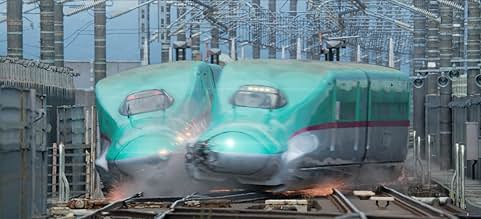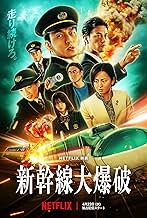Um grupo amarra bombas em um trem-bala japonês na tentativa de extorquir dinheiro do governo.Um grupo amarra bombas em um trem-bala japonês na tentativa de extorquir dinheiro do governo.Um grupo amarra bombas em um trem-bala japonês na tentativa de extorquir dinheiro do governo.
- Direção
- Roteiristas
- Artistas
Avaliações em destaque
But this is really good! I like the 3D-effects regarding to the bullet train and I green screen effects where they made it exceptionally clear. In perspective this not really realistic as it is in Japan, 'cause it's too much of actions. But in general I liked the actor's character more their personalities that fits into the movie. I was surprised about the character's performance regarding to bomber that planted the bomb on the train. That felt so good with the twist in the good way. However that is, I'm not gonna spoil it. So watch the movie and enjoy actions felt with sweat and tears. You'll not regret it!
OK so it's over long (losing momentum a bit in the second half), and the villain when revealed is an eye roll that doesn't really make all that much sense. But despite that its a fun and at times tense action / disaster movie, the type of which doesn't get made all that much these days.
The cast are all good, and the sfx are generally good, although they would have benefitted from a slightly higher budget here and there. Some great cinematography too.
I think anyone who likes movies like Unstoppable, Silver Streak, Speed and other similar disaster movies will find much to enjoy in this film.
The cast are all good, and the sfx are generally good, although they would have benefitted from a slightly higher budget here and there. Some great cinematography too.
I think anyone who likes movies like Unstoppable, Silver Streak, Speed and other similar disaster movies will find much to enjoy in this film.
An affectionate and well-realised update of Junya Sato's The Bullet Train, Bullet Train Explosion's devotion to delivering relentless edge-of-your-seat thrills ensures it's a blast from the moment it leaves the station. After his masterful reworking of Ultraman 3 years ago, I've been patiently waiting for Shinji Higuchi's next film. While the visual effects, direction, cinematography and camerawork are all top-notch, the carnage feels relatively restrained compared to Higuchi's prior work. However, even then, the film's greatest strength lies in its construction of tension and its commitment to showing how people respond to chaos. Some rise while others fall. Even with Higuchi as the film's conductor, this is still very much a one-track film, where Sato's original cross-cuts the action on board its Shinkansen with Ken Takakura's criminal antics, and here we are solely dedicated to the action on board. Despite its familiarity, there's also a fair dose of originality, although the late-game villain reveal had me howling with unintentional laughter. It's a long journey, full of near misses and assorted beats of suspense; although it abandons the complicating human factors that gave the original its soul, the film works very effectively as both a remake and a legacy sequel alike, even if the first half is far stronger than its latter half. Backed by strong performances and a rousing score by Taisei Iwasaki, Bullet Train Explosion is an effectively solid action disaster throwback, full of collectivism and collaboration.
If you're looking a lazy afternoon-watch this weekend that doesn't want you to think too much, this Japanese-version of 'Speed' but on a Bullet Train might be worth considering.
The film was fairly decent until the major reveal that was not really convincing at all, but if you forceful yourself to apply the logic you often see in the news about 'bad actors', you could maaaaybe see why/how it all makes sense.
But like I said, if you don't want to think too much, or at all, this might be one of the decent films for this weekend, or even for passive viewing as you do the dishes or fold your clothes away. Could have been so much better but I didn't care that it was not that and it doesn't feel like a let down.
The film was fairly decent until the major reveal that was not really convincing at all, but if you forceful yourself to apply the logic you often see in the news about 'bad actors', you could maaaaybe see why/how it all makes sense.
But like I said, if you don't want to think too much, or at all, this might be one of the decent films for this weekend, or even for passive viewing as you do the dishes or fold your clothes away. Could have been so much better but I didn't care that it was not that and it doesn't feel like a let down.
I just finished watching Netflix's new "Bullet Train Explosion" (2025) and couldn't help but notice all the comments claiming it's "just a Speed ripoff." Oh, sweet summer children of cinema...
For those whose film history knowledge apparently begins with Keanu Reeves, allow me to enlighten you: "Shinkansen Daibakuha" isn't copying Speed (1994). It's a REBOOT of the ORIGINAL "Shinkansen Daibakuha" from 1975 - a Japanese disaster thriller released NINETEEN YEARS BEFORE "Speed" even existed.
That's right. The "can't slow down or it explodes" concept that everyone associates with "Speed" was actually pioneered by this Japanese film starring Ken Takakura, Sonny Chiba, and other legendary Japanese actors nearly two decades earlier. The original featured Japan's bullet train that would explode if it dropped below 80km/h, with criminals demanding ransom money.
So who copied whom? If anything, "Speed" borrowed from Japan, not the other way around. Shinji Higuchi's new Netflix adaptation is simply bringing a Japanese classic back to life for a new generation.
The irony of Western viewers accusing a Japanese reboot of copying an American film that may have been "inspired" by the original Japanese concept is absolutely delicious. It's the perfect embodiment of that meme where someone makes a joke, someone else says it louder, and gets all the credit.
For those whose film history knowledge apparently begins with Keanu Reeves, allow me to enlighten you: "Shinkansen Daibakuha" isn't copying Speed (1994). It's a REBOOT of the ORIGINAL "Shinkansen Daibakuha" from 1975 - a Japanese disaster thriller released NINETEEN YEARS BEFORE "Speed" even existed.
That's right. The "can't slow down or it explodes" concept that everyone associates with "Speed" was actually pioneered by this Japanese film starring Ken Takakura, Sonny Chiba, and other legendary Japanese actors nearly two decades earlier. The original featured Japan's bullet train that would explode if it dropped below 80km/h, with criminals demanding ransom money.
So who copied whom? If anything, "Speed" borrowed from Japan, not the other way around. Shinji Higuchi's new Netflix adaptation is simply bringing a Japanese classic back to life for a new generation.
The irony of Western viewers accusing a Japanese reboot of copying an American film that may have been "inspired" by the original Japanese concept is absolutely delicious. It's the perfect embodiment of that meme where someone makes a joke, someone else says it louder, and gets all the credit.
Você sabia?
- CuriosidadesThe 109 terror case that the TMPD boss and JR officials constantly references is named after the HIkari 109 bullet train that was threatened with a bomb in the original 1975 Bullet Train movie. The Hikari train is one of the original 1964 Shinkansen trains still in service on the Tokaido to San'yo lines. Before it was part of the Shinkansen service, the Hikari was an express train until 1958. It was considered the fastest train in Shinkansen line until Nozomi trains in 1992.
- ConexõesRemake of O Trem Bala (1975)
Principais escolhas
Faça login para avaliar e ver a lista de recomendações personalizadas
Detalhes
- Data de lançamento
- País de origem
- Central de atendimento oficial
- Idioma
- Também conhecido como
- Pánico en el tren bala
- Locações de filme
- Empresas de produção
- Consulte mais créditos da empresa na IMDbPro
- Tempo de duração
- 2 h 14 min(134 min)
- Cor
- Mixagem de som
- Proporção
- 2.35 : 1
Contribua para esta página
Sugerir uma alteração ou adicionar conteúdo ausente































